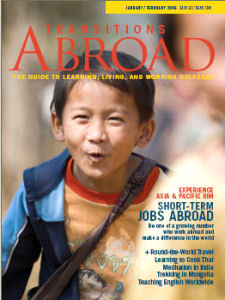TRANSITIONS ABROAD: Living and Learning in Other Countries

Today's newcomer to the newsstand is Transitions Abroad, a bimonthly that's dedicated to providing its readers with information on how to travel overseas with a purpose: as a student, a volunteer at some sort of nonprofit activity, or a wage-earning expatriate, most often as a teacher of English.
This is, of course, the antithesis of the standard travel magazine. You won't find any ads for posh resorts or cruise lines in Transitions Abroad, which has been around for almost three decades and is published in Bennington, VT. Instead, you'll find articles on getting work permits in Germany, dealing with culture shock in rural Japan and studying Italian during the day in Milan while the kids you are nannying are off at school.
About a third of the recent issue of Transitions Abroad that's come into the MagSampler.com newsstand is devoted to scatter-shot one-page quickies about some aspect of life in a particular foreign city or country from expatriate freelance writers. The magazine would do better, in my opinion, to have longer in-depth pieces about the realities of a foreigner trying to get by in those environments. But some of these shorties are informative and amusing. For instance, a woman who signed up for a five-day cooking class in Chiang Mai, Thailand relays some of the off-the-cuff advice of her cooking teacher, including "Wash your hands directly after chopping chili peppers and before you go to the bathroom; if you get chili juice on your special places, no one can help you."
In the middle of the magazine are 18 pages of listings of all sorts of short-term volunteer opportunities around the world. You have to pay your way to most of them, and then will probably have to pay at least a modest sum to participate, although a few will trade your labor for room and board. One of the more exotic listings: "Volunteers needed at chimpanzee sanctuary in Yaounde, Cameroon, for minimum six months. Should be able to communicate in French and be prepared for harsh living conditions."
The last one-third of the magazine, largely devoted to an array of articles about teaching English abroad for fun, profit and intercultural experience, was of the greatest interest to me. In part, this is because I spent most of two years just after college doing just that, but in a bizarre environment: a high school in South Vietnam during the height of the war in the late 1960s. What people would do in those days to avoid the draft!
People all over the world are anxious to learn English from native speakers, and apparently an American can at least survive just about anywhere on the planet if he or she is willing to teach English, either at a private or public school, to the employees of corporations or even as one-on-one tutors. "The joke in China," according to one article, "is you just need to be breathing to get a job teaching English." In this issue you'll find well-informed articles about teaching English in such countries as China, Russia, Chile, Taiwan and Germany. There are plenty of pitfalls to avoid, especially when you sign up to work for a private language school. If you're not careful, you could wind up a virtual indentured servant, with most of your pay and your airfare home withheld for a variety of nefarious reasons. These articles in Transitions Abroad contain lots of good advice on how to negotiate the best deal.
I also liked a conventional travel article in the issue about going around the world cheaply and intelligently. Author Tim Leffel identifies five geographical clusters that are inexpensive and endlessly interesting: (1) Southeast Asia, (2) Eastern Europe and Turkey, (3) Morocco, Egypt, Jordan and Syria, (4) Latin America, and (5) India and Nepal. He suggests buying a bare-bones round-the-world air ticket through a consolidator that touches on two or three or these clusters, then spending several months in each, staying in inexpensive lodging and being flexible and open to all that you experience. And, of course, staying far away from the resorts that cater to foreign tourists. Sounds good to me!
An annual subscription to Transitions Abroad (six issues) is $28.00 from the publisher; we'll send you a sample copy for $2.59.


0 Comments:
Post a Comment
<< Home